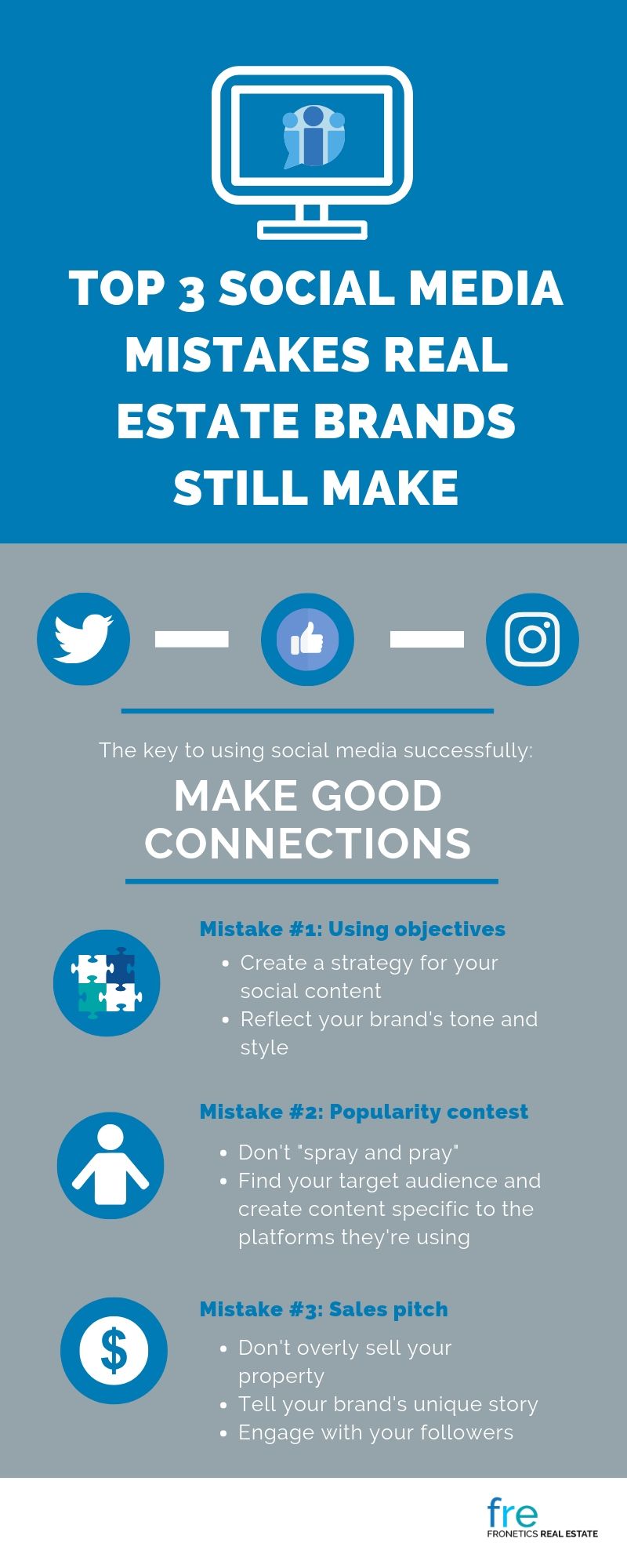Your search results for "Social media"

Social Media for Real Estate: 5 Social Media Hacks to Grow Your Business
Social media and real estate are a natural match. These five strategies will help you make the most of this powerful set of marketing tools.
Social media for real estate marketers is a powerhouse. These are free platforms that marketers can use to share their businesses with the public, generating plenty of returning customers in the process. These five social media hacks are a great place to get started growing your real estate marketing business.
1. Find your brand identity using social media for real estate
One of the top frustrations among new social media marketers happens when they try to create a strong following based solely on name recognition. In order for your target audience to be reached and engaged, your brand’s identity needs to be fully fleshed out and presented in your online profiles. Presenting a strong brand identity gives potential buyers the tools to find you, and to decide that you’re the right match for them.
2. Diversify across platforms
While Facebook still reigns supreme in the social media universe, if you aren’t connecting with users on other platforms, you’re missing out on huge opportunities. While each platform requires its own content and posting strategy, you’re essentially presenting your brand identity from the various angles allowed by different platforms. Not only that, using multiple social media platforms helps improve your search engine rankings.
3. Get social—connect with relevant groups
We’ve written before about the value of guest blog posting when it comes to real estate marketing. The same holds true for your social media for real estate strategy. Finding relevant influencers for your brand, and affiliating with them on social media is a great way to reach a broader segment of your target audience. Reach out to influencers to ask them to share your content—it’s a win for both of you.
4. Keep up with the latest
Staying up with what your audience and community on social media is talking about helps ensure that your content is relevant and engaging. Follow hashtags that are relevant for your real estate business, for example, and when you see content that resonates, share it on your own profiles, along with some analysis.
5. Use SEO tools
SEO tools (like Google Trends, Similar Web, and more) aren’t just for websites—they’re an excellent way to boost your reach when you leverage social media for real estate. These tools can help increase your follower counts, as well as your post visibility. In turn, your search rankings will get a boost.
Building your real estate brand can seem like a daunting task, but social media for real estate provides real estate marketers an easy-to-use set of tools. Be strategic about your content and strategies, and watch your business grow and develop.
Related posts:
- Must-Know Social Media Strategies for Real Estate
- 10 Social Media Statistics for Real Estate Marketers 2018
- Social Media Can Be a Strategic Weapon in Real Estate Marketing
Your search results for "Social media"

Measure Social Media Success in Terms of Potential, not Dollar Amount
Social media gives you access to aspirational buyers and their networks, a benefit that can’t be quantified in dollars. It’s time to redefine social media success.
One of the trickiest things about implementing a social media strategy is that social media success can be difficult to measure. While most real estate professionals acknowledge that a social media marketing presence is important, it’s hard to make a case for resources when you can’t precisely quantify the value in terms of dollar amount.
Of course, you shouldn’t stop recognizing the importance of social media as part of a robust marketing strategy. You need to start thinking about value in terms of potential, rather than an immediate sale or rental.
Social media success in real estate will seem more attainable if you:
- Shift the focus from short-term sale to the long-term value of social media.
- Trust your efforts will pay off, even if not immediately.
- Find new ways to measure results over time.
Social media success comes from access to a new audience
Social media allows real estate professionals to discover and engage with a new segment of the market: aspirational buyers and renters. Suddenly, you are faced with an exciting prospect: access to a population that businesses in the past could not reach. Now that we can find out who they are, their long-term value cannot be overstated:
- They are your potential buyers.
- They can build brand loyalty for your business.
- They can engage with your properties.
According to a recent study published in MIT Sloan Management Review, aspirational buyers are likely to follow multiple brands on social media sites. Over half follow at least one brand that they haven’t made a purchase from. But, “our data suggests that they do plan to purchase in the future,” say the study’s authors. “Today’s followers are very likely to be tomorrow’s customers.”
It’s easy to see the implications for real estate marketing, as you can target your messaging for individuals who may not yet be ready to sign a contract, but who are following your properties with interest.
The social network = social media success
There’s another factor to consider regarding the value of social media marketing. At its core, these are networking platforms. That means you not only have access to a new audience base, but to their connections as well.
Your followers’ engagement on social media can expand the reach of your brand and properties, as they engage with their own networks. Putting a dollar value on such social reach is fairly meaningless — but it has the potential to add to your bottom line both now and in the future. For social media success, reach is an important part of the equation.
What’s more, a recent McKinsey study attributes word of mouth to be the primary influence for up to 50% of all purchase decisions. The study authors go on to say, “Followers who are not yet purchasers can share their experience with the brand, and deepen their commitment to the brand, even prior to that first purchase.”
It’s time we start thinking about social media success in this new way: in terms of potential and expanding value, rather than just immediate dollar amounts.
Related posts:
- 10 Social Media Statistics for Real Estate Marketers 2018
- Social Media Can Be a Strategic Weapon in Real Estate Marketing
- How to Use Social Media Hashtags in Real Estate Marketing
Your search results for "Social media"

5 Tips to Step Up Your Real Estate Social Media Marketing
Real estate marketers are increasingly turning to social media as a strategic tool to grow brand awareness, gain market intelligence, and generate organic traffic. Here are five tips to boost your real estate social media marketing efforts.
If you’re a real estate marketer, it’s probably old news that the vast majority of the real estate market has moved online. Increasingly, traditional marketing tactics are giving way to newer methods, and inbound marketing is taking the place of outbound. We’ve said it before and we’ll say it again: real estate and social media are a match made in heaven.
You should be making the most of this incredible tool for marketing luxury and commercial real estate. Here are our top 5 tips to grow your real estate social media marketing in 2019.
1. Be authentic
Social media for real estate marketing is all about the personal. Users on these platforms are looking to connect with the real people behind the brands they follow. Increasingly, social media users are craving authenticity. Part of building your brand is about discovering and cultivating your “corporate personality,” particularly when it comes to social media. Find your brand’s voice, and let it shine through.
2. Use hashtags strategically
Using hashtags well can help increase your properties’ visibility, as well as growing organic reach on Twitter, Facebook, and Instagram. Using hashtags in your social media content lets you categorize your content, draw attention quickly and easily, drive conversations, increase visibility, and harness the power of topics on social media. Check out our guide for using hashtags in real estate marketing here.
3. Make use of the right tools
With demand comes supply, and as social media marketing has become more and more important, developers have created some extremely helpful tools to help you streamline your efforts. Whether it’s free stock photos, tools that help you create infographics, or automating your social media posts, there’s likely a tool that will help you get the job done more quickly and easily.
4. Diversify across platforms
While Facebook still reigns supreme in the social media universe, if you aren’t connecting with users on other platforms, you’re missing out on huge opportunities. While each platform requires its own content and posting strategy, you’re essentially presenting your brand identity from the various angles allowed by different platforms. Not only that, using multiple social media platforms helps improve your search engine rankings.
5. Engage with your followers
It may seem painfully obvious, but too many real estate marketers forget that social media is just that: social. When followers engage with your posts, always reply! Encourage comments and shares—and join the conversation. Not only is it a great way to cultivate a loyal following, but you can also gain valuable insights into your audience’s preferences.
As with any marketing endeavor, a crucial first step for social media marketing is strategy. We’ll leave you with this idea—your real estate social media marketing will benefit immeasurably from a clear, documented strategy, with measurable goals and a mechanism for collecting and analyzing data. Used wisely, social media can help build your brand, engage your potential buyers and renters, generate leads, and establish your reputation as a trusted resource.
Related posts:
- Social Media Can Be a Strategic Weapon in Real Estate Marketing
- 10 Social Media Statistics for Real Estate Marketers 2018
- Top 10 Social Media Posts 2018
Your search results for "Social media"

Infographic: Top 3 Social Media Mistakes Real Estate Brands Still Make
Social media is a valuable tool for real estate brands, but only if they use it to their best advantage and avoid these three common mistakes.
Highlights:
- Social media is one of the most effective ways to increase brand awareness and generate leads.
- All social media channels have a differentiating quality that makes them appealing to specific audiences. Don’t try to tackle every platform, focus on where your target audience is spending time.
- Real estate brands that succeed on social media are finding innovative and creative ways to engage and connect with their users.
91% of real estate professionals use social media. And we all understand why. By 2019, it is estimated that there will be around 2.77 billion social media users around the globe. That’s a lot of potential customers.
So it’s easy to understand why real estate brands are using social channels to boost their marketing efforts. Social media is an easy and effective way to increase your properties visibility and reach new audiences, but only if you use it correctly.
Top three social media mistakes real estate brands make
Mistake #1: Using objectives
Marketers need to use strategy to effectively utilize social channels. With the constant updates and changes to social platforms, real estate brands need to plan out content, frequency of posts, and pillar topics. Instead of posting with objectives in mind — like increasing leads — try to create posts that reflect your brand, follow your style guidelines, and reflect your brand’s tone.
A clear strategy can also help improve ROI. Almost two-thirds of marketers still struggle to prove their marketing efforts on social platforms are working. With a defined social media strategy, you can create specific goals, track and measure your efforts, and make changes when needed.
Mistake #2: Popularity contest
It’s easy to think that posting on all the most popular social channels is the best idea. Think again. Social media platforms have specific qualities that make them popular among audiences. Real estate marketers need to identify their target audience and find out what social channels they are using.
The next step is to create content that aligns with those platforms. As marketers, we know how easy it is to post the same content across all platforms. The success behind social media is authenticity and engagement, so it’s important your posts reflect this. Create content, like video, that caters to social channels to help build brand awareness and loyalty.
Mistake #3: Sales pitch
Being overly “salesy” will make prospects run – maybe right into your competition. The best way to win buyers on social media is through engagement. Content that helps prospective buyers envision themselves in your property is what will increase your organic reach. Create innovative and informative content that stands out on social channels by telling your brand’s story. This unique perspective will help create an emotional connection will have a long-lasting impact on viewers and drive brand loyalty.
Related posts:
- 5 Creative Ways to Use Instagram Stories for your Luxury Real Estate Brand
- Measure Social Media Success in Terms of Potential, not Dollar Amount
- How to Use Social Media Hashtags in Real Estate Marketing
Your search results for "Social media"

Start Your Property’s Social Media Program in 6 Steps
When launching a property’s social media marketing program, make sure you’ve thought through strategy, content, and audience.
Social media marketing for real estate is a must-do. The reality is that’s where the average American is spending his/her free time — nearly 2 hours a day, according to a recent study. Using platforms like Facebook, Twitter, and YouTube to market your property, you can:
- engage potential buyers
- build brand awareness
- elevate brand position within the market
- decrease cost per lead
- increase occupancy or sales
- improve retention
- and more
Sounds great, right? But where do you start? Which platforms should you use? How will you ever convince your boss that this is a valuable use of your time?
Starting your property’s social media program can seem like an intimidating task, especially if company leadership is skeptical of the benefits. Here are six steps to launching a real estate social media program that will grow your business to its full potential.
6 steps to start your property’s social media program
1) Speak in the right terms.
Convincing management that you want your team to spend more time on social media to gain “followers” or get “shares” could be a hard sell — even though that kind of engagement is key in real estate sales and rentals. To win support, focus your argument around the factors that are most important to them. Lead generation, lead nurturing, conversions, sales, ROI, profits: this should be the vocabulary with which you approach this conversation.
2) Create a strategy — and put someone in charge.
Only 11% of companies without a documented content marketing strategy find their efforts to be successful, compared to 60% of companies with a strategy in place. And that number rises to 86% when the company designates someone to lead the strategy.
Develop a content marketing strategy — inclusive of social media — that aligns with your goals for the property (e.g., more visits to the website, increased occupancy, better retention rates). And whether someone on your team heads up execution or you outsource that responsibility, the leader should continually monitor analytics and tweak the strategy accordingly to ensure the property’s social media program is meeting the designated marks.
Which brings me to…
3) Determine which analytics to track.
In real estate social media, shares, likes, and impressions speak to your brand exposure, so they’re important to track. But it’s important that you’re looking at more than just these surface metrics. (Read more about so-called “vanity metrics” here.) Leads generated, conversion rates, sales, and ROI are going to tell you if your efforts are helping your bottom line. If you have a good, flexible strategy in place, these metrics will help you adjust your efforts to ensure you’re achieving your business objectives.
4) Develop quality content.
Twenty-seven million pieces of content are shared every day — and a large portion of it is crap. A social media presence could be pretty pointless unless you’re not using it in a way that your followers find valuable. Good, quality content is the alpha and the omega, the key to engaging your followers.
One of the biggest mistakes real estate marketers make is using social channels to push a blatant sales pitch. You’ll quickly lose your audience that way. Your property’s social media should be about engaging target buyers or tenants, building brand awareness, and offering valuable and interesting information.
5) Decide which channels are right for your business.
Who are you trying to reach, and what are you trying to tell them? These are good questions to ask when trying to determine which platforms will comprise your social media program. You need to know who your target buyer/tenant is, and you need to know what kind of information you’re going to offer them.
There’s a wealth of data out there about who uses which channels and when. Most social media platforms also have their own built-in analytics tools that can help you determine the best time for engagement with your followers.
Another thing to consider: You’ll want to choose channels that you’ll be able to maintain regularly and which play to your strengths. If you don’t have the time, skill, or interest in taking regular photographs of things around your property, for example, Instagram probably isn’t for you. Remember, you’ll likely want to work through several different channels to reach a maximum number of potential customers.
6) Follow your competitors.
Following your competitors is a great way to stay up to date on what they’re doing, especially if you don’t have a ton of time or money for competitive research. And when I say “follow,” I don’t mean “copy or imitate.” I mean subscribe to their blogs, engage with them on social media, and like and share their content that you find meaningful for your audience. This way, you become part of the local conversation happening online, and you know exactly what your potential buyers and tenants are seeing from (and how they’re reacting to) your competitors.
Related posts:
- The Metrics You Should Be Measuring in Real Estate Marketing
- 6 Marketing Tasks Real Estate Marketers Can Outsource
- Social Media Can Be a Strategic Weapon in Real Estate Marketing





